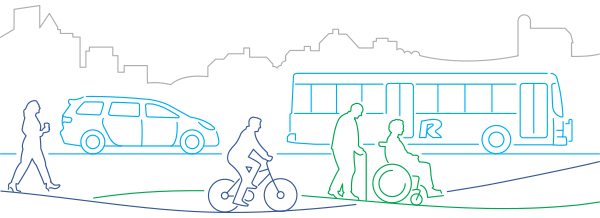Press Releases - Department of Transportation
Updated: Montgomery County Provides Updates on Four ‘Streeteries’ for Fall
For Immediate Release: Tuesday, August 23, 2022
Note: An earlier version of this release erroneously referenced a survey from M-NCPPC in the Newell Street portion of this release. This version also clarifies language within the Newell Street Section.
Four “Streeteries” that were created in early 2020 by Montgomery County as a temporary concept to support businesses struggling from the economic impacts of COVID-19 and allow residents to gather freely on public streets closed to cars are now being reevaluated for fall as the pandemic continues to ease. The County’s Streeteries include Newell Street in Silver Spring, Price Avenue in Wheaton and Norfolk and Woodmont avenues in Bethesda.
The County has been working with communities around each location to establish a long-term plan for each space. The Streeteries will continue in some fashion, although some will change their concept.
The Montgomery County Department of Transportation (MCDOT) has managed the closing of streets to vehicles as part of the Streeteries plans. The closed streets have allowed residents and businesses to use public spaces for in-street activities such as biking, walking, outdoor dining and retail activity. Management of the spaces and collection of community feedback has been led by the County’s respective Regional Service Centers (RSCs).
“The Streeteries have provided a practical solution to a pandemic-related problem,” said County Executive Marc Elrich. “They served as much-needed gathering spaces during the pandemic and provided a creative solution. Now as the situation has changed, we worked with the community in each area to decide how these spaces will continue to operate. The Streeteries showed new possibilities and I would like to see how we might continue some form of these activities as we move beyond just trying to accommodate the activities within the constraints of the pandemic.”
Streeteries generally, have had hospitality businesses involved and allow for alcohol consumption in public areas that were off limits previously.
“The Streetery model proved an effective and popular option in some areas and licensed businesses successfully ensured responsible alcohol service,” said Alcohol Beverage Services Director Kathie Durbin. “Alcohol Beverage Services is committed to ongoing collaboration with license holders so that communities can continue to enjoy the Streeteries safely,”
Future plans for the four Streeteries for fall, as determined by input from their respective communities:
Newell Street, Silver Spring
Newell Street will reopen to cars after Labor Day. However, it will close to vehicular traffic for scheduled public events throughout the year.
Price Avenue, Wheaton
Price Avenue will remain in operation as a Streetery for the foreseeable future.
The Mid-County RSC has indicated that it is looking to expand the Streetery to be more inclusive of bicyclists and walkers. A community meeting regarding the Streetery is planned for late September or early October to gather additional community feedback on ways to better accommodate pedestrian traffic.
This fall, the Washington Suburban Sanitary Commission (WSSC) has planned repairs to its facilities that run under Price Avenue. The work may require WSSC to temporarily close the Streetery for a few days.
Norfolk Avenue, Bethesda
Norfolk Avenue will remain in operation as a Streetery, and closed to vehicles, for the foreseeable future.
Woodmont Avenue, Bethesda
The Woodmont Avenue Streetery will be temporarily suspended, and partially reopened to traffic after Labor Day during construction of the long-planned and partially constructed Woodmont Avenue Cycle Track. Construction is expected to commence after Labor Day.
The Bethesda-Chevy Chase RSC is circulating a survey to gather feedback from residents and businesses. Survey results will be used in developing long-term plans for the Streetery. The owner of the adjacent properties (Federal Realty Investment Trust) is planning a privately funded redesign to increase outdoor dining capacity. Long-term design decisions have not been made, and the County will continue to work with the community to keep the area as a hub for outdoor dining while potentially restoring traffic movement through the block.
The Streeteries were part of MCDOT’s Shared Streets program, which included smaller pockets designated for recreation during the pandemic and allowed businesses to use streetside parking spaces and sidewalks.
Many of those businesses have already returned to normal operations. Businesses that are still operating with COVID-19-related accommodations, without the Streetery designation, will need to have County permits after Labor Day to ensure accessibility requirements are met. Streeteries have accessibility requirements built into their designs.
“During the pandemic, we relaxed the permitting requirement on the use of tents and café spaces on sidewalks in support of businesses,” said Department of Permitting Services Director Mitra Pedoeem. “Although we will work with businesses after Labor Day, they will need to reach out to the Permitting Services Office if they have not yet secured tent and outdoor café permits to ensure they comply with accessibility requirements.”
Over the winter months, Streetery locations may be suspended if significant winter storm conditions occur.
"Streeteries have undeniably changed how we look at the public right of way,” said MCDOT Director Chris Conklin. “Working with the RSCs, Urban Partnerships and Parks—in the case of Newell Street—we have developed a process where the community determines the capacity of their local Streetery long-term. We are optimistic that these streets will continue to serve the public well.”
For information on MCDOT programs and services visit montgomerycountymd.gov/mcdot, follow @MCDOTNow on Twitter, Facebook and Instagram and subscribe to MCDOT’s “Go Montgomery!” newsletter.
# # #
Release ID: 22-101Media Contact: Emily DeTitta 240-372-2282



